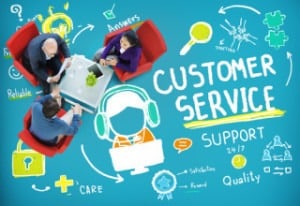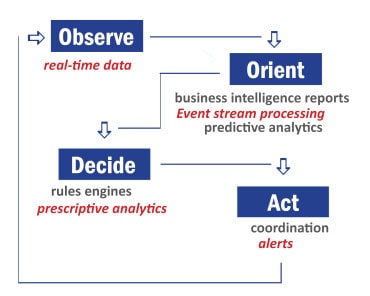
As artificial intelligence and machine learning become more integral to customer service, all employees will have agent-assist tools at their fingertips — but these five industries are positioned to take that approach now.
Many companies still heavily rely on designated customer service representatives today. But more and more businesses are empowering employees who do not have a traditional customer service title to be able to take care of their customers.
These companies understand that by giving their employees the resources to understand and empathize with customers, and solve their issues, they are not just providing more efficient issue resolution but are also working to advance broader business development goals.
At a minimum, customers expect speedy service, and having more people capable of helping out with inquiries is important, especially for lean teams. Creating a positive customer experience is arguably the most important competitive advantage for businesses today, and having a well-staffed support team, regardless of individual titles, is integral to achieving that positive customer experience. Reducing wait time for customers by having more hands on deck just makes sense.
[ Related: IoT in Retail Marketing: Three Ways to Engage Customers ]
Moving one level deeper, though, employees who have direct knowledge of customers and product issues are better equipped to develop the business. These employees can take their learnings from customers and integrate feedback into the business, and use customers as a data point for moving the company forward. Employees may also have to research answers to questions that will help them improve their product knowledge too.
AI to impact customer care
As artificial intelligence and machine learning become bigger players in the customer care space, employees will have even more resources at their fingertips. Knowledge base suggestions will help them speedily answer tickets even more accurately, and as companies begin to venture deeper down this path of big data, efficiency will reach an unprecedented level.
The barrier to entry for “becoming an agent” will therefore be reduced even more, because of these agent-assist tools. This methodology for ‘empowering everyone to be an agent’ should become a harmonious notion and will continue to be applicable across industries. Here are five that really stand out:
Hospitality
Customer service in the hospitality industry is ripe for disruption. Today when guests are staying at a hotel, they must be in their hotel room and call down to the front desk (on a landline) in order to place orders that will be dispatched to housekeeping or room service. But there’s a huge opportunity here for hotels to cater to guests by having their employees on the floor armed with support capabilities.
For example, Red Planet Hotels provides its employees at the front desk with in-app messaging to be able to directly respond to their guests’ inquiries. They receive the message on their phone like they would receive a normal chat or text, and are able to respond likewise. They could be walking the grounds, taking care of business as usual while also taking care of guest requests.
Medical and veterinary care
When it comes to medical questions, people do not want to wait around for answers, whether they pertain to themselves or their beloved pets. There are plenty of occasions for making in-person (or in-animal) visits, but sometimes problems can be addressed over the phone or online. Kaiser Permanente has a great system where you can call or email back and forth with your doctor directly, as opposed to having to schedule an appointment, check in with the front desk, and be seen by a nurse … a time-consuming process necessary before seeing the doctor.
[ Related: Real-Time Customer Service Will Soon Be the Rule ]
VCA Animal Hospitals also serves as a great example. It has in-app live messaging so that pet owners can have a near-real time chat conversation with a veterinarian, right within the VCA app. Each veterinarian that is a part of VCA can help out directly, which makes them more accessible and favorable as a result.
Sharing economy
Ride-sharing companies like Lyft and Uber do allow passengers to speak with their drivers directly for most circumstances, only sometimes requiring that they go through their traditional support channels. This allows most issues to be taken care of quickly, like picking up a left-behind wallet — in contrast to having to wait 24 hours for a customer service agent to reply.
And companies like Airbnb take it to the next level by empowering everyone to help out, not even limiting sources of support to employees. The company is using Directly to outsource support — not to call centers — but to product experts. The Directly platform finds community experts so that they’ll have direct and accurate knowledge of a specific area of the product and get paid accordingly: essentially on-demand, customized customer service.
Mobile Gaming Companies
Mobile games can have tens of millions of customers, so having a team that can handle that kind of scale is crucial. Next Games has a player support boot camp that all of the employees must complete. The boot camp involves trainees’ handling customer issues directly and really becoming embedded in the customer service-oriented culture.
All Next Games employees are equipped to handle player inquiries and have a more thorough understanding of their games and customer experience as a result. In fact, they’ll even have developers ask to speak with players who are writing in during product releases to retain a holistic view of their product.
Airlines
When passengers need assistance while traveling, the last thing they want to do is wait on hold for a customer service agent. And if they are already in the air, they don’t even have that option unless they have paid for Wi-Fi. The only thing they can do if they are having an issue is ring the flight attendant call button and wait around for someone to help them.
[ Related: How an e-retailer employs machine-learning to reduce customer churn ]
How great would it be if passengers could send a message to a flight attendant, and hear back in real-time on how they are going to be helped? With in-app messaging, that’s a definite possibility. Imagine not having to waiting for everyone to give their drink order before giving yours, and then waiting infinitely longer for the drink to arrive: it would come after a quick text. Flight attendants wouldn’t have to walk back and forth as much either, they could just wait for an order to come in! This would be ideal for literally both sides of the aisle.
These industries have specific use cases showing massive potential for achieving an improved customer service experience by giving all employees the tools to autonomously help customers. But the range of companies that could benefit is certainly not limited to this list. At the end of the day, this really boils down to a simple concept of increasing efficiency by breaking down an existing bureaucratic structure.
That’s something that could benefit businesses across the board.





























